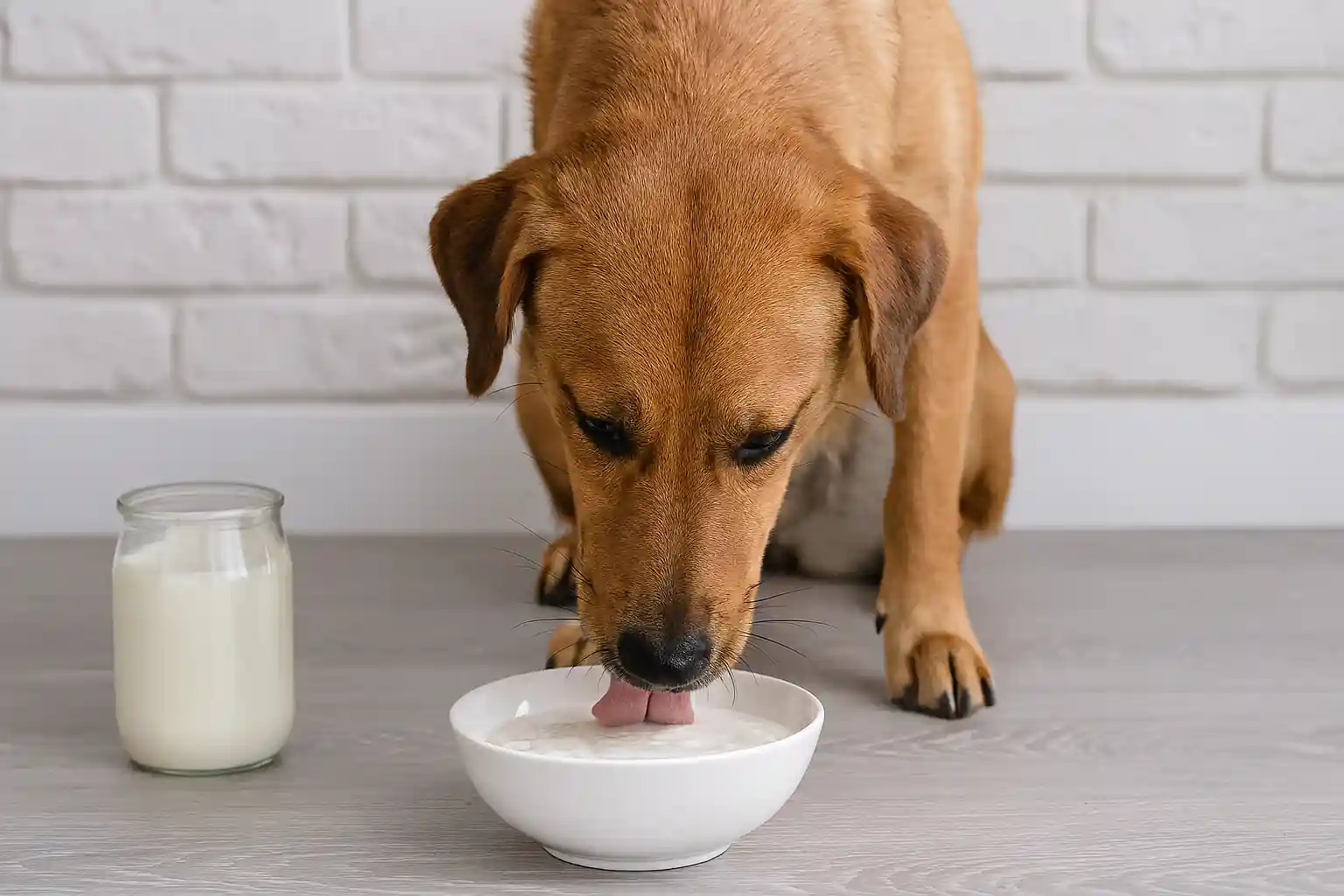Can Dogs Eat Yogurt? A Complete Guide to Feeding Yogurt to Your Dog
Yogurt has become a popular food choice for humans due to its probiotic benefits, creamy texture, and versatility. Naturally, many dog owners wonder whether dogs can eat yogurt, whether yogurt is good for dogs, and if feeding yogurt to a pet offers any real health benefits. The idea of offering yogurt to your dog might seem appealing, but there are important considerations regarding the type of yogurt, how much yogurt to give, and the potential risks of flavored yogurts, added sugar, or harmful ingredients such as xylitol.
This comprehensive guide explores everything dog owners need to know about yogurt for dogs, from the benefits of yogurt for dogs to safe serving sizes, kinds of yogurt to choose, and common myths. By the end of this article, you’ll understand whether dogs eat yogurt safely, what kind of yogurt to feed, and how eating yogurt might impact a dog’s health.
Yogurt and Dogs: What You Need to Know
Yogurt is a dairy product made by fermenting milk with bacterial cultures. It is commonly consumed by humans for its probiotic benefits, calcium, protein, and digestion support. But when it comes to dogs, yogurt isn’t always straightforward. While dogs can eat yogurt in some cases, not all dogs can handle dairy well. Dogs are lactose intolerant to varying degrees, meaning some dogs may develop diarrhea or an upset stomach after eating yogurt.
If you’re considering adding yogurt to your dog’s diet, you’ll need to check the ingredients list to make sure it doesn’t contain xylitol, an artificial sweetener also known as birch sugar that is toxic to dogs and can lead to liver failure. Flavored yogurts often contain added sugar or artificial sweeteners, making them unsafe for dogs.
Can Dogs Eat Yogurt?
The simple answer is yes, dogs can eat yogurt, but with some important caveats. Dogs may enjoy plain yogurt or greek yogurt in small amounts, provided that the yogurt isn’t flavored, doesn’t contain xylitol, and is free from artificial sweeteners.
When feeding yogurt, the type of yogurt matters. Plain greek yogurt or plain yogurt with no added sugar is usually the safest choice. Dogs eat greek yogurt better than regular yogurt in many cases because greek-style yogurt contains less lactose. This makes it easier for a dog that isn’t severely lactose intolerant to digest.
Yogurt for Dogs: Is Yogurt Good for Dogs?
Many dog owners ask: is yogurt good for dogs? Yogurt can be good for dogs in moderation. Yogurt contains probiotics that support a healthy gut, calcium for bone strength, and protein that helps with overall health.
However, yogurt isn’t an essential part of a dog’s daily diet. A complete and balanced dog’s diet already provides the nutrients a dog needs. Yogurt is better considered as a healthy snack or a dog treat rather than a dietary requirement.
As long as it’s plain, unsweetened yogurt and given in a small amount, yogurt can offer probiotic benefits and aid digestion.
Benefits of Yogurt for Dogs
Probiotic Benefits
Probiotics in yogurt may help support a dog’s digestion. A dog’s ability to digest lactose decreases as it grows older, but the beneficial bacteria in yogurt can sometimes help balance the gut flora. Dogs with minor digestion issues may benefit from small amounts of probiotic yogurt.
Calcium and Protein
Yogurt contains calcium, which supports strong bones and teeth. It also provides protein that contributes to muscle maintenance. For dogs, this can be an additional boost to their dog’s diet, though not strictly necessary if they already consume a high-quality dog food.
Digestive Aid
Feeding yogurt may help dogs with mild digestion issues, though it should not replace veterinary care if a dog displays severe diarrhea or stomach upset.
Feeding Yogurt to Dogs Safely
How Much Yogurt to Give
Many dog owners wonder: how much yogurt to give? The amount of yogurt depends on the dog’s size and tolerance.
-
A small dog can usually handle about one teaspoon.
-
A medium dog can have one to two teaspoons.
-
A large dog may have up to a tablespoon or two.
Always start with a small amount of yogurt to see how your dog reacts. Dogs may have yogurt without issue, but others can develop dog diarrhea if they are sensitive or lactose intolerant.
Feeding Yogurt as a Treat
Yogurt can be given as a dog treat rather than a daily food. You can freeze yogurt in ice cube trays and serve yogurt cubes as a refreshing summer snack.
Additions and Combinations
Instead of flavored yogurts, you can buy plain yogurt and add fresh fruit safe for dogs, such as blueberries or strawberries, to create a natural and safe treat. Avoid strawberry yogurt or other flavored yogurts made for humans because they often contain added sugar.
What Kind of Yogurt is Safe for Dogs?
When it comes to choosing the right type of yogurt, not all yogurts are created equal.
Plain Yogurt
Plain yogurt is the safest option. It doesn’t contain added sugar or harmful ingredients, making it the best choice to feed your dog.
Greek Yogurt
Greek yogurt, or greek-style yogurt, contains less lactose than regular yogurt. Dogs eat greek yogurt better than standard yogurt because it is easier to digest. It also contains more protein.
Unsweetened Yogurt
Unsweetened yogurt ensures there are no hidden sugars that can make your dog sick. Sugar isn’t toxic for dogs, but excessive sugar can lead to weight gain and digestion issues.
Yogurt Made Specifically for Dogs
Some companies create dog yogurt made specifically for pets. These are safe for dogs as they don’t contain harmful ingredients. However, always check the ingredients list to make sure.
Risks of Feeding Yogurt to Dogs
While yogurt can be safe for dogs, there are risks if you don’t choose the right type or feed too much yogurt.
Lactose Intolerance
Dogs are lactose intolerant to varying degrees. A dog’s ability to digest lactose decreases after the puppy stage when it no longer relies on mother’s milk. Dogs that are lactose intolerant may develop diarrhea, gas, or vomiting after eating yogurt.
Added Sugar and Flavored Yogurts
Flavored yogurts, including strawberry yogurt, often contain added sugar. Sugar is not toxic to dogs but isn’t healthy for them. Excess sugar can cause obesity and dental problems.
Xylitol and Artificial Sweeteners
Some yogurts contain xylitol, also known as birch sugar, which is toxic to dogs. Even a small amount of yogurt containing xylitol can make your dog sick and lead to liver failure. Always check the ingredients list to make sure the yogurt doesn’t contain xylitol.
Dog Diarrhea
Too much yogurt, or feeding yogurt to a dog that is lactose intolerant, can cause dog diarrhea. Always introduce yogurt in small amounts and monitor your dog’s digestion.
Probiotics in Yogurt: Do They Help Dogs?
Probiotics in yogurt are often praised for improving digestion and promoting a healthy gut. Dogs can benefit from probiotic benefits too, but the concentration of probiotics in human yogurt may not be enough to treat digestive issues effectively.
Veterinarians often recommend probiotic supplements made specifically for dogs rather than relying on yogurt. Still, yogurt containing probiotics can be a healthy snack that supports digestion when given occasionally.
Serving Yogurt to Your Dog
There are many creative and safe ways to serve yogurt to your dog:
-
Plain yogurt on food: Add a small amount of yogurt to your dog’s diet as a topping.
-
Frozen yogurt treats: Freeze yogurt in ice cube trays for a cooling snack.
-
Mix with safe fruit: Buy plain yogurt and add fresh fruit that is safe for dogs, such as blueberries.
-
Homemade dog treats: Combine unsweetened yogurt with peanut butter (without xylitol) to create healthy snacks.
Remember that yogurt isn’t a replacement for a complete and balanced diet. It should be given as an occasional treat rather than part of a dog’s daily caloric intake.
Dogs Eat Greek Yogurt: Why It’s Often Better
Dogs eat greek yogurt better than regular yogurt because it contains less lactose. For dogs that aren’t severely lactose intolerant, greek yogurt may be easier to digest. Greek yogurt also has a thicker texture, higher protein content, and fewer sugars.
When choosing greek yogurt for dogs, ensure it is plain greek yogurt without added sugar, artificial sweeteners, or flavorings.
Curious about adding natural calcium to your dog’s diet? Discover the benefits and safety tips in our comprehensive guide: Can Dogs Eat Eggshells – Egg Shell Safety and Benefits.
Frequently Asked Questions About Yogurt for Dogs
Can dogs have yogurt every day?
While dogs can eat yogurt, it’s not necessary to give yogurt daily. Feeding yogurt too often can lead to digestion problems or excessive calorie intake.
Can yogurt help with dog diarrhea?
Yogurt contains probiotics that may help with mild dog diarrhea. However, if your dog displays persistent diarrhea, consult a veterinarian instead of relying on yogurt.
Is strawberry yogurt safe for dogs?
Strawberry yogurt made for humans usually contains added sugar or artificial sweeteners. It’s better to buy plain yogurt and add fresh strawberries in small amounts.
Can puppies eat yogurt?
Puppies can eat yogurt, but many dogs are lactose intolerant, so it’s best to offer only a very small amount. A puppy’s digestion is still developing, and too much yogurt can upset their stomach.
What type of yogurt should I buy?
Look for yogurt that is plain, unsweetened, and doesn’t contain xylitol. Plain greek yogurt is often the best option.
Final Thoughts: Should You Feed Yogurt to Your Dog?
Yogurt for dogs can be a safe and healthy treat as long as you choose the right type of yogurt and feed it in moderation. Dogs can eat yogurt, particularly plain yogurt or plain greek yogurt, as long as it’s free from added sugar, flavored ingredients, or toxic additives like xylitol.
Feeding yogurt to your dog can provide probiotic benefits, support digestion, and act as a healthy snack. However, yogurt isn’t necessary for a complete and balanced dog’s diet and should never replace a dog’s regular food.
If you want to feed yogurt to your dog, start with a small amount of yogurt, monitor your dog’s reaction, and always check the ingredients list to make sure it doesn’t contain xylitol or artificial sweeteners. Dogs may enjoy yogurt as an occasional treat, but too much yogurt can lead to diarrhea, especially in dogs that are lactose intolerant.
In conclusion, yogurt can be a fun, safe, and nutritious way to treat your dog, as long as it’s served in moderation, carefully selected, and introduced gradually into your dog’s diet.

